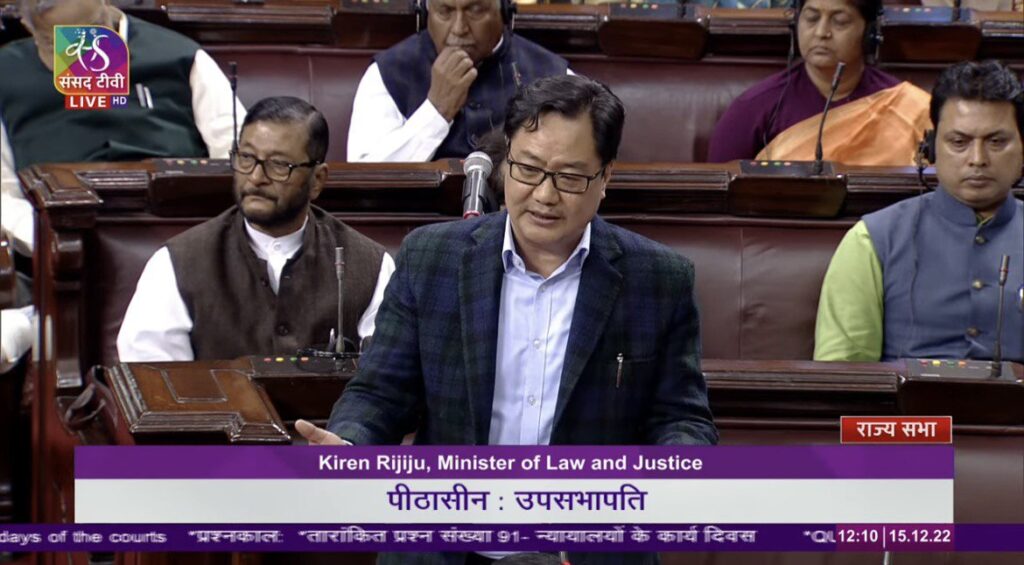New Delhi, Dec 15.
Law Minister Kiren Rijiju on Thursday blamed the collegium system of judges appointing judges for the judicial vacancies and piling case arrears and said the system will not improve till this process was changed.
He said that the government only had a “limited role” in the system which was not in keeping with the Constitution or the people’s sentiments (as reflected by Parliament) and hence couldn’t do much about judicial vacancies and the huge arrears.
The government had provided all infrastructural support to the judiciary to cope with the work load, the minister said.
Budgetary allocations, which hover at around 0.1 per cent of the total outlay, are far from ideal as compared to developed nations and the judge strength hopelessly adequate, as per figures available with the judiciary. The highest expenses in the budgets are for elections.
The judiciary has been at the receiving end of a barrage of criticism recently after the Vice President in a speech opened the floodgates for this in Rajya Sabha. The Supreme Court has not taken kindly to the criticism and had advised the government’s top law officers to rein in the discordant voices.
Rijiju has been particularly scathing of the huge court arrears which now stand at over 5 crore cases across the country, both inside and outside the House. This translates into a delay of over a decade at the lower court and an average of 5 to 7 years in the High Court and the Supreme Court.
The executive has sought to tap into this disenchantment with a slow-moving judiciary to push for a change in the process of appointing judges to let the executive have the final say over the names appointed to the constitutional courts i.e., the High Courts and the top court.
Today Rijiju was speaking in the Rajya Sabha where MPs are entitled to free speech. Answering a range of questions, Rijiju spoke of the need to reduce court holidays to hasten the justice delivery process.
Though court holidays have been sharply reduced in recent years and judges insist they need a respite, from daily grind of holding open court hearings, to write judgements, the criticism continues.
He also spoke of lack of representation from different sections of society and spoke of need of appointing quality judges. He said that the existing system did not reflect either the spirit of the Constitution or popular will as reflected by Parliament.
“… the spirit of the Constitution says it is the government’s right to appoint judges. It changed after 1993,” he said. The collegium system was put in place by the Supreme Court in this year to protect the independence of the judiciary.
Rijiju sought to lay the blame for the judicial vacancies on the collegium system, suggesting perhaps that all the delays were from the judicial side. “Unless the procedure of appointment of judges changes, the issue of high judicial vacancies will keep cropping up,” he said.
In another controversial statement made in the House yesterday, Rijiju had suggested that the Supreme Court must stick to its constitutional role and examine serious issues involving the Constitution and not take up bail pleas and PILs which are frivolous.
“… you take up cases which are relevant. If Supreme Court starts hearing bail applications or frivolous PILs it will cause lots of extra burden,” he had said, drawing criticism from the Opposition which said that personal “liberty” was an important constitutional value which courts are mandated to protect. Bail is the rule and jail the exception under our system, the Opposition pointed out.
“More than 4 crore cases are pending in trial courts…. We give money, support to create better infrastructure. But we have to ask the judiciary to ensure that only deserving people are given justice,” Rijiju had said.
In one of its first ambitious moves to unsettle the court-mandated collegium system, the government had enacted the National Judicial Appointments Commission in 2014, but that was struck down by the top court.
The government then tried to push through a revised memorandum of procedure to get a final say – by inserting a clause that would allow it to reject names on the ground of national security. That was also rejected by the top court. It has now sought to ratchet up public pressure on the judiciary to get its act together.

